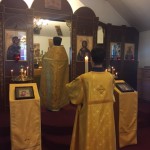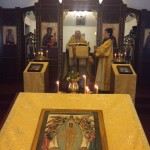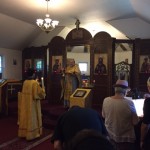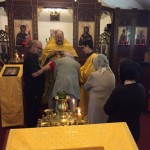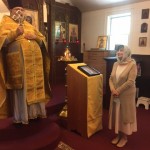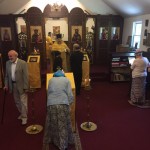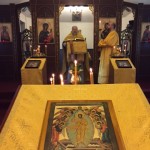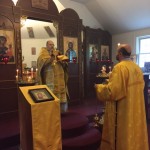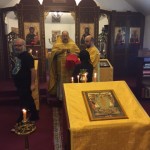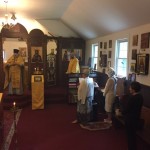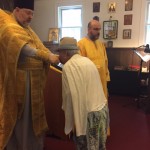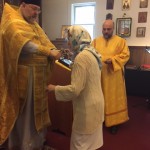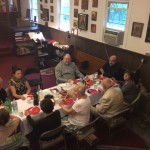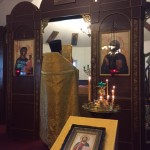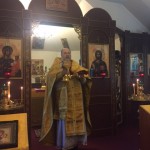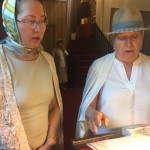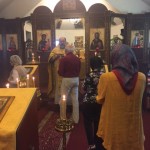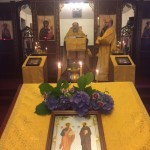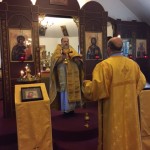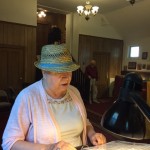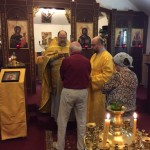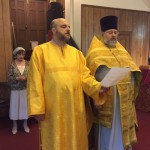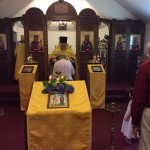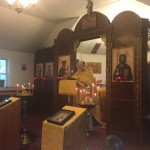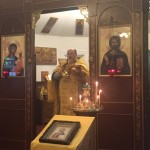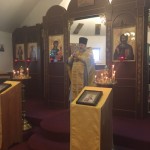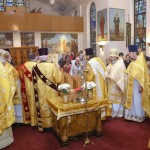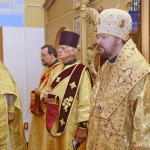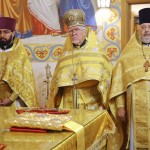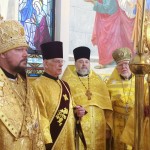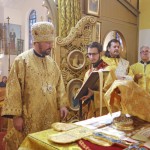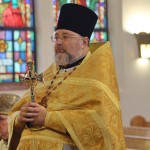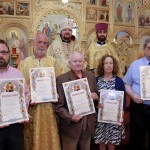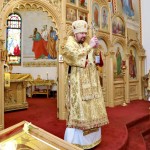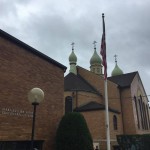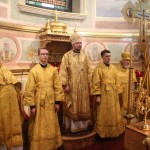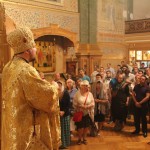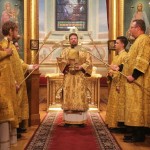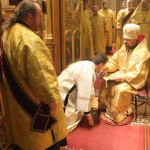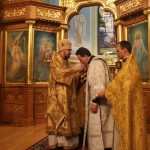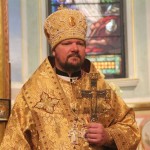On July 30, on the 8th Sunday after Pentecost, as well as the Sunday of the Holy Fathers of the Six Ecumenical Councils, Rector of St. George Church, Archpriest Igor Tarasov served the Divine Liturgy in our parish temple. After the reading from the Holy Gospel he preached a homily in Russian. An English translation of that homily is as follows:
”Today’s Gospel reading is telling us about the feeding of the five thousand and the miraculous multiplication of loaves and fishes.”
“First of all, we should note that it was a very large number of people, because it was five thousand men. If you add women and children, you may conclude that the crowd was probably about fifteen or more thousand. We should consider that this large number of people followed Christ on foot in the heat of the day into the wilderness and without food. What faith and devotion they had, these people who followed Jesus! Now compare this to us, modern Orthodox who are reluctant to come to church on Sunday. We drive the air-conditioned cars and we still don’t come.”
“Reflecting further, we can see that this miracle took place not for the personal vanity or glory of the Savior, but out of compassion for the people. We can see this in many miracles of Christ and it is mentioned again in today’s Gospel how the Lord healed the sick. Each miracle of Christ is an act of love performed out of compassion.”
“Let us now examine how Jesus performed that miracle. Our Lord took up the five loaves and fishes, and then looked up to heaven and thanked the Father and blessed the food. St. John Chrysostom interpreting this Gospel lesson says that in this way Jesus showed that He is equal to God the Father. Jesus look up to heaven, prays to His Father but He Himself begins a miracle. Here He also sets us Orthodox the example of praying before eating. How many Orthodox often forget even to make the sign of the cross before eating! And yet the Savior Himself, “by Whom all things were made”, asks for the blessing of the Father before eating.”
”The miracle takes place in a deserted place and when the day is over. According to St. John Chrysostom, this shows us that Christ is not limited by space and time. St. John wrote about this event the following beautiful words: “Although the place is a desert, He who feeds the universe is present. Although the day is over, Christ and His words are ever-present, never submitting to time or element.””
“And St. John Chrysostom says that by blessing and multiplying bread and fish, Christ shows that He is also the Lord of Land and Sea.”
“Another aspect of today’s Gospel story is that in this miracle we see how Christ not only feeds us with material food, but also with spiritual food, for, as it is written in the Holy Scriptures, “man shall not live by bread alone, but by every word that proceeds from the mouth of God” (Deut. 8, 3; Mt. 4, 4). Today we commemorate Holy Fathers of the six Ecumenical Councils. There were seven Councils, and six of them defined the dogmas of Orthodox faith. Thus the Fathers of the six Councils were given us and confirming spiritual nourishment of the true faith leading to eternal life. Nowadays people are looking for different diets to stay physically healthy. The Ecumenical Councils came up with a spiritual diet for us: they defined what is spiritually healthy for us to consume, and what is harmful for us as a spiritual food.”
“Performing the miracle of multiplying the breads, our Lord gave also spiritual food to the people. We may see that spiritual nourishment in the numbers mentioned in this Gospel. There were five loaves of bread. The number five represents our five senses that are fed by the Bread of Life. In our prayers of thanksgiving after Holy Communion we mention our five senses that are to be enlightened. There were two fishes. They represent the two parts of the New Testament, the Gospels and the Epistles, which were written by fishermen become fishers of men, for we are spiritually fed by their writings. There were twelve baskets of fragments? They represent the twelve Apostles who preach to the ends of the universe, the fragments who feed our souls with the words of Christ through the Holy Spirit.”
”Dear brothers and sisters! Let us open our minds and souls to Christ our true God. Let us follow Him anywhere His divine Providence would make us to go. Let us strife to be with Him, so we too may be fed and filled with the Bread of Life.”
The choir beautifully performed hymns in honor of the Holy Fathers of the Council, as well as in honor of recently celebrated Holy Equal to the Apostles Prince Vladimir.
Following the Liturgy dismissal the Rector preached a brief sermon in English stressing the main points of his Russian homily. He also congratulated Valentina Malyshev on the occasion of her past name day and her birthday. The traditional Polychronion was proclaimed.

